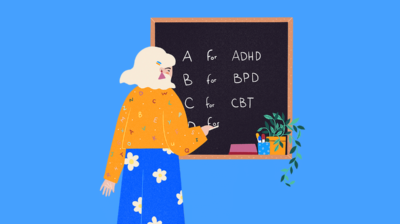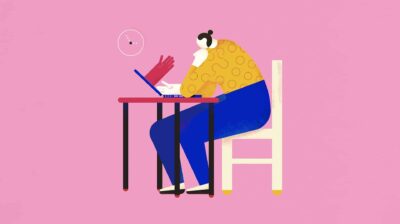Practical CBT skills I use to help with panic attacks
Laura looks at how Cognitive Behavioural Therapy works and some skills to practice day to day to help your mental health.

Cognitive Behavioural Therapy or CBT is a type of talk therapy which helps people understand how their thoughts and behaviours impact their emotions. I’ve found CBT really helpful in my own life as I have learnt to deal with a panic disorder. Before learning CBT skills, I suffered from daily panic attacks and was completely unaware that the way I was thinking was having an impact on my emotions. I frequently felt overwhelmed and this would lead to a panic attack. For me, this felt like a tightness in my chest, difficulty breathing, sweaty palms and forehead. My mind would also race and I have an overwhelming feeling of dread. Instead of facing the situation which was causing my anxiety, I began to avoid the situation and distract myself from the anxiety I felt by keeping myself busy with other activities. I did not realise that my actions were allowing my cycle of panic attacks to continue as I was never dealing with the root of the anxiety.
I started CBT in a group setting with a trained therapist. I decided to write this article to help others who may experience levels of anxiety and would like to learn practical ways to help it.
How does CBT work?
An important part of CBT is that thoughts and feelings really influence our behaviours. For example, a person who thinks a lot about times in the past where they interacted with people, or think about how others view them, may avoid social situations. The goal of CBT is to learn that we can not control the world around us but we can control how we view events. Sometimes the situations which are causing difficulty for us are connected with negative thoughts which our brain accepts as true. CBT helps us to challenge these negative thoughts and reshape them.
Practical CBT Skills
Many CBT skills encourage us to step back from a situation and challenge why we’re thinking about something in a certain way. Our brains have developed these thoughts (mostly negative) as a way of protecting us. Looking back at the example of the social situations, a person’s brain may file away an incident of a panic attack. The brain believes it is protecting you from a dangerous situation i.e. the social event as this caused a distressing outcome i.e. the panic attack. It is important not to push yourself too hard as essentially, we are changing habits and thoughts of a lifetime.
Taking note of your thinking patterns
Despite the fancy name, this is a very basic idea. With this, you are encouraged to take note of the thoughts you have in particular situations. You should then start to see your pattern of thinking. This pattern of thinking may be leading you to a negative mood. Tracking the way you think using “mind maps” and challenging them can be really helpful.
I have a notebook full of ‘mind maps’ where I have written the situation and my thoughts, feelings and behaviours. Seeing my thoughts, feelings and behaviours written down has made it easier to understand the link between them and how challenging my thoughts will have a positive impact on my emotions and behaviour.
For example, I had a presentation in college which didn’t go as well as I had hoped and it has led to a lot of anxiety. I use a mind map to understand the process for next time:
- Thoughts – “I can’t do this.” “I’m not a good speaker.” “I don’t like crowds.” “I don’t know enough about this topic and I will feel like a fraud.”
- Bodily Sensations – Heart racing, butterflies in tummy, tense muscles
- Feelings -Anxiety, dread, frustration, overwhelmed
- Behaviour – Stayed up late to prepare, drank a lot of coffee to keep me alert
I can see from this exercise how my emotions, thoughts and behaviours helped shape the event. The negative talk and self-doubt raised the feelings of anxiety. This impacted my behaviour which was ultimately damaging. Not getting a refreshing sleep will impact my concentration, focus and even confidence as I am not at my best. Drinking too much coffee will drive the anxiety. To notice negative thoughts and to catch them and replace them with positive self-talk is important. To notice and observe thoughts and feelings is a large part of the work. Knowledge is power.
Exposing yourself to the situation that makes you anxious
For most people we avoid what we fear or dislike. However, this is not always practical in our lives. Avoiding things only keeps you afraid of them. It also restricts our lives.
Exposing yourself little by little to the thing you fear or are worried about is a helpful skill. You can take it slowly and just expose yourself for a short period at first. As you get more comfortable, you can increase the time you expose yourself or how often you expose yourself to the thing you’re worried about. Eventually you’ll find you’re much more comfortable with it.
For me, the restriction of public transport induced anxiety in the past. Graded exposure worked in the following way:
- M a list of public transport situations from the ones that gave me the least anxiety to the ones that gave me the highest level of anxiety.
- Choose an activity on the list that gave me the least anxiety and kept doing it until my anxiety reduced.
- Repeat this task until it became easy and then moved on to something that gave me more anxiety. If the first task you select is causing you too much anxiety, switch to something easier.
My experience began with me going one stop on a local bus with a friend to going a long journey alone with many steps in between.
Scheduling activities
This skill is a particular help stop you procrastinating which can be an issue when you’re feeling anxious. It helps make the most out of your day by maximising your time to include activities in all areas of your life. It can be as simple as using a diary or even a reminder on your phone to schedule events. I found this one particularly helpful as living with anxiety can take up so much brain power it can be easy to forget events or to organise things in your head, especially if there are some situations you are avoiding.
Using these skills in everyday life takes practice but I’ve no doubt they are helpful in keeping my anxiety at baseline. Like all therapies, there is not a “one size fits all” so what is helpful for some may not be helpful for others. I have found it useful to use these skills working with a trained counsellor. I have also learned the importance of patience and the need for steady progress with these skills as you are literally retraining your brain. It takes time and practice but the hard work is worth it to live a more manageable and mindful life.
Feeling overwhelmed and want to talk to someone?
- Get anonymous support 24/7 with our text message support service
- Connect with a trained volunteer who will listen to you, and help you to move forward feeling better
- Whatsapp us now or free-text SPUNOUT to 50808 to begin.
- Find out more about our text message support service
If you are a customer of the 48 or An Post network or cannot get through using the ‘50808’ short code please text HELLO to 086 1800 280 (standard message rates may apply). Some smaller networks do not support short codes like ‘50808’.






